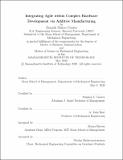Integrating agile within complex hardware development via additive manufacturing
Author(s)
Coates, Donald Mateo.
Download1191622496-MIT.pdf (10.89Mb)
Other Contributors
Sloan School of Management.
Massachusetts Institute of Technology. Department of Mechanical Engineering.
Leaders for Global Operations Program.
Advisor
Stephen C. Graves and Stephen C. Graves.
Terms of use
Metadata
Show full item recordAbstract
A major benefit of Additive Manufacturing (AM) is a faster timeline from design to fabrication. As AM has matured to be able to create functional prototypes and end-use products, the ability to quickly fabricate physical hardware iterations without associated tooling costs and lead times is now possible. Software companies have embraced iterative-based product development processes (PDP) such as Agile. Iterative development has allowed for the validation of innovative and untried solutions, fueling the rapid speed of software development. However, within complex hardware industries, like automotive and aerospace, almost all companies instead follow a Waterfall or Phase-Gate PDP. Large capital costs, along with the aforementioned lengthy tooling and supplier lead times, make the control and predictability of a Phase-Gate process appealing. However, the trade-off is a process where the final content gets decided near the beginning of a multi-year timeline, often translating to product launches with soon-to-be stale technologies. Within the context of automotive, this thesis explores how leading edge technology could continue development in a parallel Agile process. Though the use of AM, the new technology could be integrated later into a Phase-Gate process with minimal schedule risk or cost. This process keeps the strict one-way review gates for the more stable components, while allowing greater flexibility for innovative features that could benefit from further iteration. I use Design Structure Matrix theory to simulate the performance and schedule of this proposed PDP. I then discuss the implications of this new PDP architecture and its benefits for complex hardware industries in general.
Description
Thesis: M.B.A., Massachusetts Institute of Technology, Sloan School of Management, May, 2020 Thesis: S.M., Massachusetts Institute of Technology, Department of Mechanical Engineering, May, 2020 Cataloged from the official PDF of thesis. Includes bibliographical references (pages 113-117).
Date issued
2020Department
Sloan School of Management; Massachusetts Institute of Technology. Department of Mechanical Engineering; Leaders for Global Operations ProgramPublisher
Massachusetts Institute of Technology
Keywords
Sloan School of Management., Mechanical Engineering., Leaders for Global Operations Program.